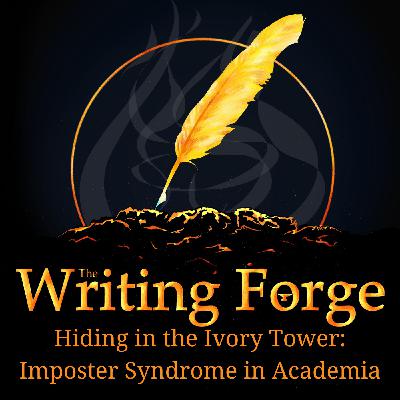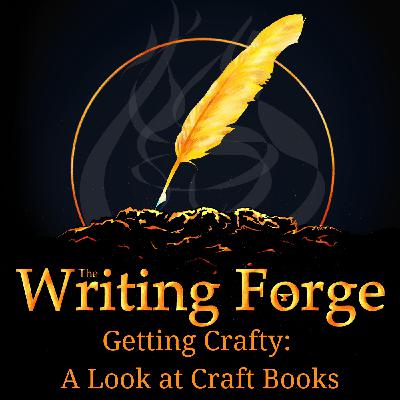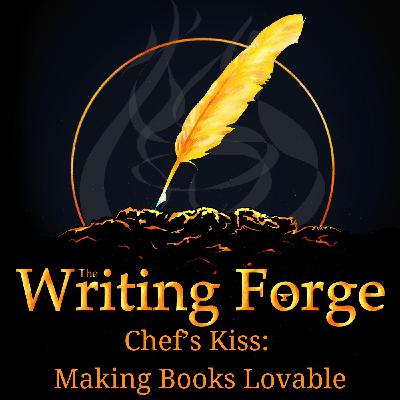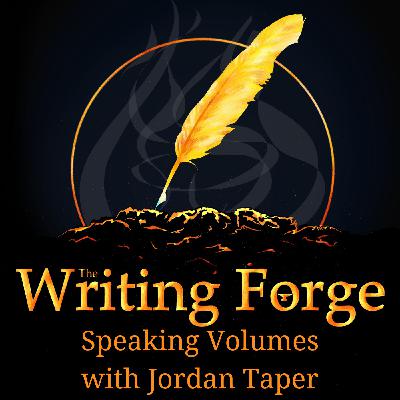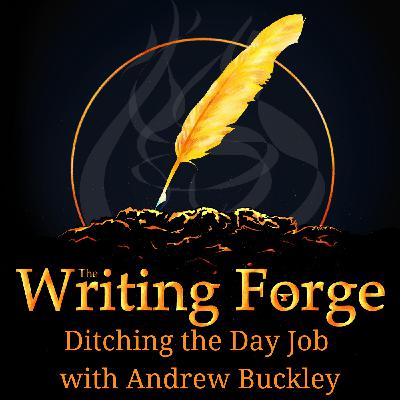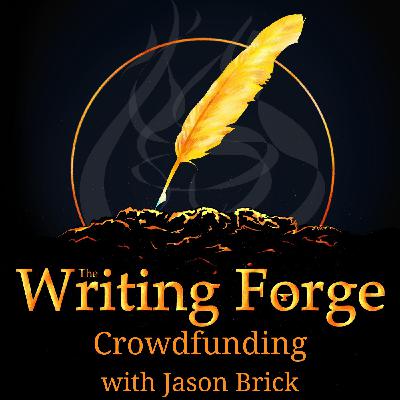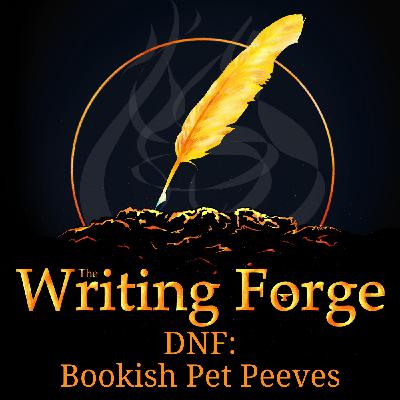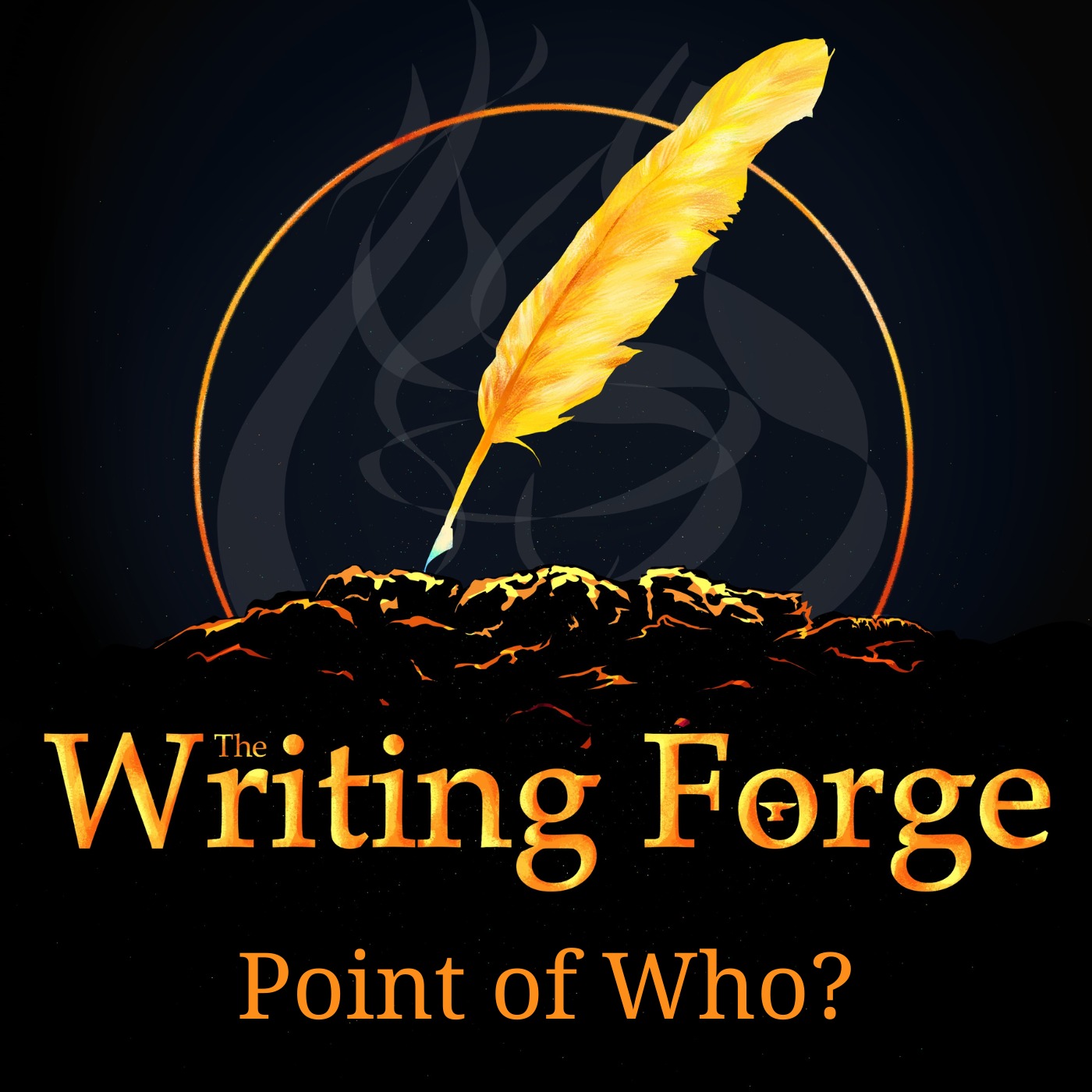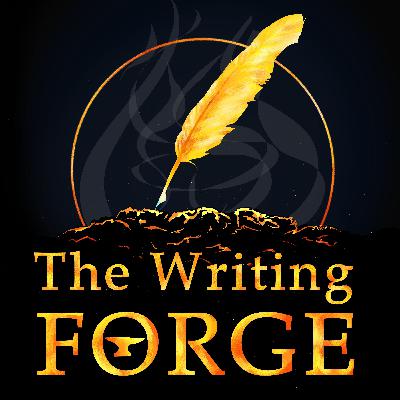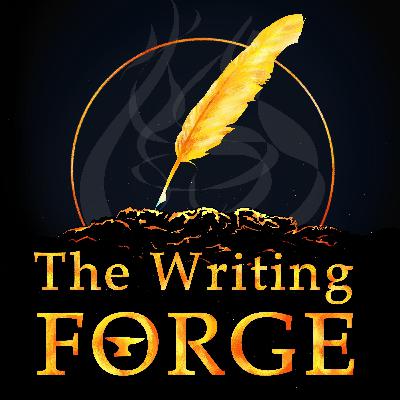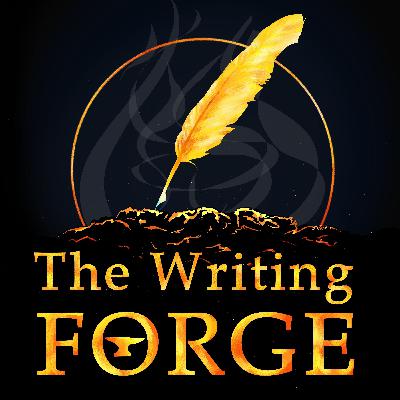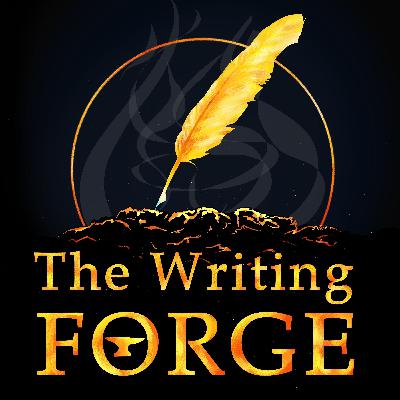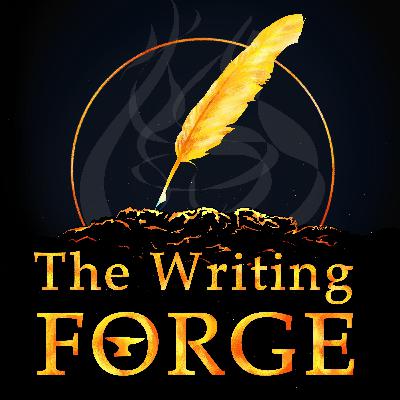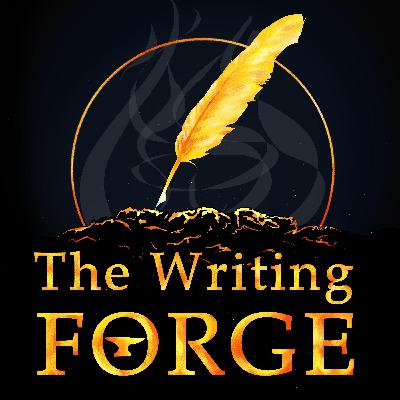Discover The Writing Forge
The Writing Forge

The Writing Forge
Author: Writing Heights Writers Association
Subscribed: 24Played: 80Subscribe
Share
© All rights reserved.
Description
Welcome to The Writing Forge, where we discuss tips and tricks for honing your writing craft. Each episode, a guest will join hosts Miranda and Bonnie to hammer out the skills a writer needs to succeed in the writing world. We cover a variety of topics—from the idea phase through publication and beyond—to help you no matter where you are on your writing journey. We believe every writer has something to share to help us all learn and grow!
64 Episodes
Reverse
Hosts Bonnie and Miranda welcome Dr. Pamela D. Williams for an updated discussion on imposter syndrome, this time specifically on academic writing. The transition from student to independent scholar often leaves writers feeling unqualified, even in the midst of earning credentials. Dr. Williams and your hosts provide some tips for how academic writers can build confidence in their own voices, with a particular look at the anxiety that can mount while trying to follow a strict style guide. Whether you're a new student or seasoned scholar navigating imposter syndrome, this episode offers valuable insights and encouragement to trust your innate expertise and embrace the writing process.If you’re up for being vulnerable with us on our socials, share with us where you have encountered imposter syndrome, in academia or in your professional life!Facebook: @writingheights, Instagram: @writingheightsLinks: The first Writing Forge episode on Imposter SyndromeJoin the Writing Heights community at writingheights.comSound engineering by Luke FischerCover art by Maggie Walke
In this episode, Miranda and Bonnie dive into the value of books on writing craft, focusing on learning about the art of writing versus the act of writing itself. Your co-hosts reflect on their experiences with various craft books, exploring what separates the truly helpful ones from those that fall short. They emphasize the importance of concrete examples and actionable suggestions. The conversation also explores other ways to hone writing skills, including watching YouTube tutorials, reading editing and style books, consuming content in one's genre, and, of course, actually writing. Take a listen for insights into navigating the balance between learning about writing and putting pen to paper.What are your favorite and least favorite writing craft books? Share with us on our socials!Facebook: @writingheights, Instagram: @writingheightsLinks: Chicago Manual of Style, 18th editionThe Emotion ThesaurusThe Anatomy of StoryStory GeniusDonald J. Maas’s books on writingBrandon Sanderson’s Creative Writing LecturesOverly Sarcastic ProductionsJoin the Writing Heights community at writingheights.comSound engineering by Luke FischerCover art by Maggie Walker
Debut author Kristin Owens shares tips and tricks from her journey as a first-time author. After a brief rundown on the differences between traditional and self-publishing, our hosts discuss the importance of knowing your own strengths and goals. For those with time and patience, the traditional publishing route offers professional support all along the way, from editing to securing audiobook deals. Regardless of publishing route, a debut author should consider building up a social media presence as early as possible, finding a support group of other debuting authors, and planning a book launch that fits their personality.Check out Kristin’s debut novel, Elizabeth Sails, launched on October 8th, 2024!Facebook: @writingheights, Instagram: @writingheightsLinks: The Debutante BallRising Action PublishingJoin the Writing Heights community at writingheights.comSound engineering by Luke FischerCover art by Maggie Walker
Bonnie and Miranda welcome Amy Trent for a discussion on the timeless allure of fairy tales. Elements of fairy tales can enhance writing in any genre, from themes and motifs to character development and beyond. The conversation emphasizes the significance of happily ever afters, the challenge of avoiding clichés, and the importance of empathy in storytelling. Tune in for valuable insights and inspiration on weaving fairy tale magic into your own writing.What’s your favorite fairy tale? Share on our socials!Facebook: @writingheights, Instagram: @writingheightsJoin the Writing Heights community at writingheights.comSound engineering by Luke FischerCover art by Maggie Walker
In this episode of The Writing Forge, hosts Bonnie and Miranda focus on the positive, celebrating elements in books that elevate their reading experience. Small physical touches can make a huge difference, like consistent heights that avoid the frustration of mismatched series and detailed maps in fantasy novels. Bonnie and Miranda also highlight the appeal of well-crafted chapter titles and engaging appendices, discussing how these extras enrich the storytelling experience. With a nod to nuanced character portrayals and clever trope subversions, Bonnie and Miranda share insights on what can make a book not just enjoyable but unforgettable—at least for these two opinionated readers!How about you? What makes you put a book in a vaunted space on your bookshelf or check it out of the library 50 times? Let us know at our socials!Facebook: @writingheights, Instagram: @writingheightsLinks: Books/authors referencedHarry PotterJ.R.R. TolkienThe Princess BrideThe Night CircusBrandon SandersonThe Wheel of TimeJoin the Writing Heights community at writingheights.comSound engineering by Luke FischerCover art by Maggie Walker
In this episode, hosts Bonnie and Miranda delve into the intricacies of crafting natural and distinct dialogue with guest Jordan Taper, a writer and director of audio dramas and audiobooks. Good dialogue is crucial for writing an enjoyable narrative, and a variety of techniques can help characters sound believable: reading a manuscript out loud, ensuring character-specific word choice, even weighing the use of contractions. Our hosts explore these methods and more for ensuring each character's voice is unique and discuss pitfalls to avoid.What’s an example of really great dialogue you’ve enjoyed in a recent work? Let us know at our socials!Facebook: @writingheights, Instagram: @writingheightsLinks: Casting Call ClubJoin the Writing Heights community at writingheights.comSound engineering by Luke FischerCover art by Maggie Walker
Many writers dream of ditching the day job and writing full-time. Author and speaker Andrew Buckley joins Bonnie and Miranda to discuss his journey to full-time creativity and provide tips and tricks for thriving when writing becomes your 9-to-5. From diversifying income streams to outsourcing to tackling marketing strategies, writers have a lot of choices to make on their road to writing self-reliance. If you’re thinking of taking the plunge, take a listen!For those trying to make money as a writer, what has been your biggest marketing challenge? Let us know on your socials and hopefully we can help crowdsource some solutions!Facebook: @writingheights, Instagram: @writingheightsLinks:Writing Forge episode Outsourcing for AuthorsJoin the Writing Heights community at writingheights.comSound engineering by Luke FischerCover art by Maggie Walker
In this episode, Miranda poses the question “Bonnie, what would make you absolutely love a potential client?” Together they delve into the many ways authors can impress potential editors and agents. Tips and tricks include understanding different levels of editing, leveraging alpha and beta readers, and engaging in self-editing. They also highlight the value of preparing key documents like a style sheet, an outline, a “story bible,” and a list of comp titles to blow away an editor and make their job easier. Tune in for great tips on how to go above and beyond for your editor—and strengthen your manuscript in the process.What other things have you heard editors say they’d love to see from a client? Let us know on our socials!Facebook: @writingheights, Instagram: @writingheightsLinks:Lady Knight EditingPrevious Writing Forge episodes referenced:The Importance of Reading WidelyShaping Stories: The Role of Developmental EditingAll Greek to Me: Alpha and Beta ReadersChoose Your Own Adventures: Using Story StructureJoin the Writing Heights community at writingheights.comSound engineering by Luke FischerCover art by Maggie Walker
In the modern era of Kickstarter and Backerkit, crowdfunding has become a viable option for self-published authors to access the funds needed to publish their work. Experienced crowdfunder Jason Brick joins Bonnie and Miranda to discuss why crowdfund, as well as lay out strategies for successful campaigns and pitfalls to avoid. From setting achievable goals and offering enticing rewards to underestimating costs and failing to deliver on promises, the discussion runs the gamut of the good and bad of crowdfunding.Are you considering crowdfunding to publish? If you have, what lessons have you learned? Let us know on our socials!Facebook: @writingheights, Instagram: @writingheightsLinks:Jason’s Facebook pageBrandon Sanderson’s record-setting Kickstarter(Since this episode was recorded, Sanderon broke records yet again with another campaign on Backerkit)Most popular crowdfunding platforms:KickstarterBackerkitIndiegogoJoin the Writing Heights community at writingheights.comSound engineering by Luke FischerCover art by Maggie Walker
Plottr creator Cameron Sutter joins Bonnie and Miranda to discuss their favorite story structures and how to effectively use them. Whether you’re a planner or a pantser, understanding the elements of structure is crucial to crafting a compelling narrative. A solid grounding in a variety of structures can help you avoid plotholes, meet reader expectations, and deliver satisfying character arcs. Through intentional and flexible use of story structure, you can leave your readers both satisfied and surprised with how your story ends.What’s your favorite story structure? Let us know on our socials!Facebook: @writingheights, Instagram: @writingheightsLinks:P. Djèlí Clark’s Abeni’s DreamA few of the referenced story structures:The Campbellian Monomyth (aka the Hero’s Journey)The seven point structure as broken down by Dan WellsThe sleuth’s journeyRomancing the BeatSave the Cat! Writes a NovelJoin the Writing Heights community at writingheights.comSound engineering by Luke FischerCover art by Maggie Walker
The landscape of fiction in the United States has been morphing over the last twenty years, due in part to the translation and influence of TV shows, movies, books, and comics from other countries and cultures. Guest Katie Lewis along with hosts Bonnie and Miranda discuss their experiences reading translated works from other cultures and how it has shaped their writing and reading. Explore how manga, anime, and novels from Asia have become more popular and impacted genre writing in Western markets. Join the conversation on cultural exchange through translated media and how it has broadened and diversified perspectives in literature and entertainment.For more, join Katie as they teach a class for Writing Heights this March 30th at noon MDT. Register today to attend in person or via Zoom.What are some good translated works that you've read or experienced lately? Movies, TV shows, books, let us know on our socials so we can consume them with you!Note: Katie meant to reference the novel Tropic of Orange, not Tropic of CancerLinks:MangaNarutoMy Hero AcademiaAnime (also available as manga)Demon SlayerJujutsu KaisenMy Roommate is a CatWeb novelsThe Grandmaster of Demonic CultivationFilmsCrazy Rich AsiansEverything Everywhere All At OnceBullet TrainRequiem for a DreamPerfect BlueGuillermo del Toro's films like Pan's LabyrinthHowl’s Moving CastleNovelsThe Poppy War trilogyAll You Need Is Kill (book Edge of Tomorrow was based on)Tropic of OrangeTV showsSquid GameFacebook: @writingheights, Instagram: @writingheightsJoin the Writing Heights community at writingheights.comSound engineering by Luke FischerCover art by Maggie Walker
Got any writing pet peeves? Miranda and Bonnie take advantage of the opportunity to rant about some things that have made them put books down (or throw them across the room), discussing the pitfalls of playing tricks on readers, being unnecessarily coy, and making characters behave inconsistently for the sake of the plot. They dissect common grievances such as forced relationships, miscommunication tropes, and soapboxing, urging writers to prioritize subtlety, consistency, and nuance in their storytelling. Through their candid conversation, they emphasize the importance of seeking diverse feedback to craft compelling narratives that resonate with readers.What are some of your book-related pet peeves? Let us know we’re not ranting into the void on our socials!Facebook: @writingheights, Instagram: @writingheightsJoin the Writing Heights community at writingheights.comLinks:The book that made Bonnie take Goodreads reviewing seriouslySound engineering by Luke FischerCover art by Maggie Walker
Hosts Bonnie and Miranda welcome guest Trina Burgermeister to discuss the intricacies of writing from multiple points of view (POVs). Trina shares insights from her own writing journey, highlighting the challenges and rewards of weaving together distinct character perspectives. The conversation delves into the decision-making process behind employing multiple POVs, emphasizing the importance of letting the story dictate the narrative structure. In this exploration of the nuances of character-driven storytelling, Bonnie, Miranda, and Trina discuss techniques for balancing POV characters, avoiding pitfalls such as tangents and head-hopping, and ensuring each character's voice remains unique.What is a multiple-POV novel you’ve enjoyed recently? How did it balance the characters? Let us know on our socials!Facebook: @writingheights, Instagram: @writingheightsJoin the Writing Heights community at writingheights.comLinks:Alfred Hitchcock on Mastering Cinematic TensionBrandon Sanderson on the “Grand Skill”Sound engineering by Luke FischerCover art by Maggie Walker
Bonnie and Miranda talk with Tracy Hume about reinventing yourself to get your writing career off the ground. The trio explores the ever-evolving landscape of the writing industry, discussing platforms like webinars, conferences, and social media for staying informed. The conversation sheds light on the importance of saying yes to new opportunities and the significance of discarding what doesn't align with your goals. Tune in for a captivating conversation on reinventing yourself as a writer.Have you had to reinvent yourself in your writing career? What was your new path? Let us know at our social media links.Facebook: @writingheights, Instagram: @writingheightsJoin the Writing Heights community at writingheights.comLinks:Freelance Writer’s DenJane FriedmanAllison K WilliamsTools:BookstackRev.comOtter.aiContentlySubstackCover art by Maggie Walker
Happy New Year, and welcome to Season 3 of The Writing Forge, listeners. Returning guest David E. Sharp joins Bonnie and Miranda to talk about anti-resolutions. Embrace your personal weaknesses for yourself and your characters this year to give your story a punch, to achieve some character development, and maybe see that your weakness can be a strength after all.What sort of anti-resolutions are you going to make this year? Let us know at our social links below!Facebook: @writingheightsInstagram: @writingheightsJoin the Writing Heights community at writingheights.comCover art by Maggie WalkerLinks:Linc Library in Greeley Colorado. Check out their amazing podcast studio!
The end of 2023 is upon us! In their traditional end-of-year season finale, Miranda and Bonnie analyze the movie The Lost City. Comparing a fictional portrayal of an author with real-life writer experience provides plenty of fodder for discussion. Your hosts explore the movie’s unique take on romance, adventure, comedy, and action, highlighting the clever use of humor and the way the movie subverts genre tropes. The Lost City’s theme of not judging a book by its cover creates parallels to real-life judgments about genre fiction and the importance of embracing diverse storytelling. As we prepare for a new year, let us approach both fictional narratives and real-life experiences with an open mind and a willingness to embrace the unexpected.What writing-related movie should we discuss in next year’s season finale? Give us suggestions on our socials!Links:Romancing the StoneCastleThe Memoirs of an International AssassinFacebook: @writingheightsInstagram: @writingheightswritersJoin the Writing Heights community at writingheights.comSupport this podcast at — https://redcircle.com/the-writing-forge/donations Support this podcast at — https://redcircle.com/the-writing-forge/donations
In this episode, hosts Bonnie and Miranda welcome special guest Valerie Ihsan to discuss the critical elements of conflict, choice, and consequence in storytelling. The conversation delves into the importance of conflict in hooking readers, the significance of character flaws, and how conflict drives the overall story. Compelling conflicts are crucial for both fiction and memoir, as readers need to see believable challenges that stretch characters without making their journey impossible. The choices characters make in response to these conflicts help foster surprising and inevitable outcomes. And the consequences of these choices are integral to providing reader satisfaction and maintaining realism, regardless of genre. The three C's (conflict, choice, and consequence) can apply at various levels of storytelling, from the global structure to individual scenes. Listen today for valuable tips and perspectives to enhance your narrative craft.What are the best Conflict, Choice, and Consequences you have come across, either in others’ writing or your own? Share on our socials!Links:Baby BoomFacebook: @writingheightsInstagram: @writingheightswritersJoin the Writing Heights community at writingheights.comSupport this podcast at — https://redcircle.com/the-writing-forge/donations Support this podcast at — https://redcircle.com/the-writing-forge/donations
In this episode of the Writing Forge podcast, Kelly Lydick of Pure Carbon Publishing joins Bonnie and Miranda to delve into the world of editing. The trio unravels the distinctions between developmental and other kinds of editing, shedding light on the nuanced roles each plays in the writing process. They discuss the importance of finding the right editor, the benefits of a sample edit, and the collaborative dynamic between authors and editors. Whether you're navigating plot points in fiction or refining the scope of a nonfiction piece, this episode provides valuable insights into the crucial role of developmental editing in bringing your writing to life.How would you describe the logline of your current work in progress to a developmental editor? Let us know at our socials!Links:Dan Wells’ preface to the 10th anniversary edition of ElantrisFacebook: @writingheightsInstagram: @writingheightswritersJoin the Writing Heights community at writingheights.comSupport this podcast at — https://redcircle.com/the-writing-forge/donations
Hosts Bonnie and Miranda and guest Beth Bonness delve into the fascinating connection between dreams and poetry. Beth's unique perspective of rediscovering her passion for poetry after experiencing life-altering strokes sheds light on how dreams and the subconscious mind can influence the creative process. The discussion explores the randomness of dreaming, the emotional seeds found in vivid dreams, and the potential for inspiration that comes from tapping into your subconscious. Beth also shares her approach of writing in the morning before her to-do list wakes up, using warm-up prompts to access her creativity, and letting her thoughts percolate during sleep. This episode offers valuable insights for writers of all genres and encourages listeners to explore the connection between their dreams and their creative work. Join Bonnie, Miranda, and Beth as they unravel the mysteries of the creative subconscious.How often do you dream, and how often do you write about it? Have any interesting dreams lately? Share with us on our socials!Facebook: @writingheightsInstagram: @writingheightswritersJoin the Writing Heights community at writingheights.comSupport this podcast at — https://redcircle.com/the-writing-forge/donations Support this podcast at — https://redcircle.com/the-writing-forge/donations
Join hosts Bonnie and Miranda and guest Sonja Dewing, an award-winning author and CEO of the Women's Thriller Writers Association, as they delve into the world of AI and its applications in the realm of social media marketing. Amidst a discussion on the limitations and possibilities of AI, they explore how AI, particularly Chat GPT, can enhance your social media presence without replacing the human touch. They discuss the value of authentic and personalized content in today's digital landscape, the role of AI in content creation, and the fine balance between automation and human creativity.Tune in to discover the best practices for using AI in social media marketing, learn about the ethical considerations, and find out how Chat GPT can assist with your marketing plans.What do you think? Will you use ChatGPT for your marketing? Do you already? Let us know at our socials!Facebook: @writingheightsInstagram: @writingheightswritersJoin the Writing Heights community at writingheights.comSupport this podcast at — https://redcircle.com/the-writing-forge/donations Support this podcast at — https://redcircle.com/the-writing-forge/donations


